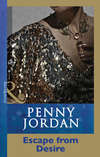Buch lesen: «Lovers Touch»

Lovers Touch
Penny Jordan

Table of Contents
Cover
Title Page
CHAPTER ONE
CHAPTER TWO
CHAPTER THREE
CHAPTER FOUR
CHAPTER FIVE
CHAPTER SIX
CHAPTER SEVEN
CHAPTER EIGHT
CHAPTER NINE
CHAPTER TEN
Copyright
CHAPTER ONE
‘IS THAT the bride? Where on earth did she get that dress?’ Grania demanded disparagingly. ‘Honestly, Nell, if Gramps had known what you were going to do with this place when he left it to you, he’d have had forty fits. It’s so …’ she wrinkled her small nose ‘so …’
‘Enterprising?’ Nell suggested drily.
They were in the book-room. And the bride whose pretty white dress her stepsister had so disparaged was making her way on the arm of her groom beneath an archway of roses into the marquee that Nell and her small staff had spent the whole of the previous day putting up and organising.
‘Enterprising or not, I still say Gramps wouldn’t have approved. And you know it.’
That was the trouble. Nell did. Her grandfather had been one of the old school: a stiff, military gentleman, fiercely proud of the tradition of his family and its service to its country. Fiercely loyal to everything he believed in, and that included an old-fashioned and outdated belief that he owed a responsibility, not just to his immediate family, but also to the small village that nestled less than a mile away from Easterhay’s front gates.
The village had been there long before the first Hugo de Tressail had built his home there, but it had been under his auspices that the shabby collection of untidy dwellings had been superseded by his manorial hall, and the Norman church with its square tower that overlooked the gentle roll of the Cheshire plain.
In the small church itself, a tomb marked the burial place of that first de Tressail, his stone effigy lying at rest on top of it in the classic medieval pose. Alongside him lay his wife, a small dog curled at her feet.
She had been a Saxon Thane’s daughter, well born but poor, and it was supposed to be from her that every now and then throughout the generations a de Tressail woman would inherit her wheat-blonde Saxon hair.
Nell had it herself, a straight waterfall of pale straw which she privately thought colourless. She would much rather have had her stepsister’s more vivid colouring, with its inheritance of Latin ancestry.
‘I wish I’d known you’d got one of these dos on this weekend,’ Grania continued disagreeably. ‘I’d never have bothered coming down.’
‘Then why did you?’ Nell asked her calmly.
At first sight many people dismissed her as timid and withdrawn, but Nell had her own quiet strengths, her own firmly held beliefs and, so some people considered, more than a touch of her grandfather’s notorious stubbornness.
‘I need an advance on my allowance,’ Grania told her curtly. She saw Nell’s face and said sharply, ‘Oh, for heaven’s sake, don’t look so po-faced. Joss won’t mind …’
‘Maybe not, but I don’t like you taking money from him,’ Nell told her stiffly.
‘Why ever not? He is our trustee and it is our money, although I’ll never understand why Gramps insisted on leaving everything tied up so stupidly. An allowance until I marry … then a small lump sum. I’d rather have the whole lot now, and I’ve a good mind to tell Joss as much.’
‘No, don’t do that.’
Nell spoke more sharply then she had intended. Outside, the last few remaining guests had gone into the marquee. She had been rather surprised at the success of her small venture into commercialism, although as yet it was true that she had not made much of a profit, barely enough to pay the wages of the staff, in fact; but it was a start. A first small step on the road to independence …
She and Grania were so different, and not just in looks. Grania had the fiery temperament of her Italian parents, Nell’s stepmother and her first husband, and she also had her careless, insouciant attitude towards money.
Her success as a model should have made it possible for her to earn more than enough to live on, and not need the small allowance Nell’s grandfather had organised for her, but Grania had never seemed to realise exactly what their financial situation was. For all her sophistication—and she was sophisticated, far more so than Nell herself, who was three years her senior—she had appeared to have no idea that the allowance she spoke of so glibly came not from their grandfather’s estate, but from Joss Wycliffe’s own pocket.
But, most shamingly of all, Nell knew that if she were to tell Grania the truth, she would not feel in the least mortified but would probably make some mocking quip about Joss being able to afford to pay her ten times as much as he did … which of course was true.
There had been a time, some months before her grandfather’s death, when Nell had wondered if Joss’s constant visits to Easterhay were perhaps because he hoped to make Grania his wife. It had seemed the only explanation for the unlikely relationship which had sprung up between her grandfather and the man who had no compunction at all about saying that he had clawed his way up virtually from the gutter to achieve the multi-millionaire status he now had.
He had moved into the area three years ago, buying a house on the opposite side of the village. Nell had heard the gossip about him before he moved in, but had scarcely expected that her grandfather would make a close friend of him, not for any snobbish reasons, but simply because her grandfather was a very reserved man, with few friends and the kind of sharp tongue that made people view him askance.
And if it hadn’t been for that fateful fall, she doubted if Gramps would even have met Joss.
Despite his age, and the handicap of a severe wound incurred during the action that had earned his KBE, her grandfather had always insisted on walking the five-mile perimeter of the parkland every morning after breakfast. The morning he first met Joss, just after the younger man had moved into the village, it had been frosty, and despite Nell’s protests Sir Hugo had insisted on going out, taking with him the German pointer that was his favourite companion. He had been seventy-eight then, crusty and irascible; and Nell had loved him desperately. He was virtually the only family she had.
There was Grania, of course, but she and her stepsister had never been close. Grania had been with her mother and Nell’s father at the time of the horrific road accident in Italy which had robbed Lucia de Tressail of her life, and reduced Nell’s father to a speechless, bedridden form who never regained consciousness. He had survived his father by a matter of days, never knowing that he had inherited the earldom, and died before Nell had taken in the shock of her grandfather’s death. Grania had rung from Italy to break the news, saying, ‘It’s quite convenient in a way. That hospital must have been dreadfully expensive, and it wasn’t as though poor Daddy knew anyone, was it?’
Grania had been taken in by the Italian relatives her mother and Nell’s father were on their way to visit. Nell had not accompanied them on that trip, primarily because someone had to remain at home with her grandfather. Naturally, when the news came through of her stepmother’s death and the full extent of her father’s injuries, it had been to her grandfather and Easterhay that she had turned.
Easterhay had been her home for as long as she could remember. Her father, an army man like his father and grandfather before him, had brought her there when she was little more than a few weeks old, leaving her in the care of his father and unmarried aunt.
His wife, Nell’s mother, had died at Nell’s birth and she had grown up here at Easterhay, unknowing of how out of date her grandfather’s mode of life was, because she had never experienced anything else.
She had been five when her father had remarried, but because of his overseas postings Nell had been eight years old before she had ever been able to spend anything more than a brief holiday with her father and new stepmother.
Lucia had tried to be kind to her; she was naturally warm-hearted, Nell recognised; but she, a child reared by a crusty retired general and his maiden sister, had shrunk from Lucia’s attempts to embrace and mother her, both literally and metaphorically. A shy, withdrawn child, she had grown up into an equally withdrawn adult, quite happily giving up her job in London to come home and nurse her grandfather when her aunt died, and Gramps announced that she would have to return home to take up her aunt’s duties.
She had been just twenty then, and that had been over four years ago. Four years during which she had been forced to mature abruptly, once she realised how precariously balanced her grandfather’s finances were.
The care of his son had eaten into his last small reserves of cash, and now with Gramps himself dead and the ominous threat of double death-duties hanging over Easterhay, Nell had no idea how on earth she was going to keep her promise to her grandfather.
Deathbed promises were like something from Dickens, she told herself as she watched her efficient staff close the entrance to the marquee. In a few mintues she would have to go down and preside over the buffet. No matter how much Grania might choose to deride today’s bride, her parents had still paid and paid well for their daughter to have her wedding reception here in Easterhay’s beautiful parkland, and the pride Nell had inherited from her grandfather, the sense of duty which living with him had instilled in her, would not allow her to do less than her very best for anyone.
‘Promise me you will keep Easterhay,’ Gramps had demanded almost with his last breath, and she, tears in her eyes and clogging her throat, had agreed.
But she still had no idea how that promise was going to be kept.
Oh, she was doing what she could … These weddings brought in a small income, kept the staff busy and paid, and also allowed her to give much needed weekend work to some of the youngsters from the village.
There was also her plan to take in weekend guests, but first some of the bedrooms needed to be renovated. She could hardly expect people to pay to use the one cold and very draughty bathroom installed on both of the two bedroom floors. Deftly she added up her small profit, wondering if she could manage to get three more bathrooms installed by Christmas. She had the workforce to do it … Gramps had insisted on keeping on a large staff even though there was little enough for them to do, other than to try to continually repair the fabric of the house as best they could.
Peter Jansen, the estate carpenter, had made the tables for inside the marquee. Harry White, the gardener, had supplied the flowers and helped her make the decorative arrangements. Mrs Booth, the cook/housekeeper, had organised the food, all of them only too glad to be doing something to lift a little of the burden from Nell’s shoulders.
Once, they and their children would have found well-paid work in Manchester or Liverpool, but those days were gone. Work wasn’t easy to come by anywhere now, and scarcely a week went by without Nell being asked if it was possible for her to find a job for ‘our Jane’ or ‘our Robert’ …
It was true that the staff lived relatively cheaply and well in the row of cottages owned by the estate, but the cottages were in need of repair, and Nell had no idea how on earth she was going to manage to finance her wages bill once it was winter.
It had occurred to her that she could always hire out the ballroom for private dances, but how many times? This was a very quiet part of Cheshire not favoured by the wealthy, and there was very little demand for such affairs, especially with Chester and the very prestigious Grosvenor Hotel so close.
Weddings were different, and there could be no better setting for a summer wedding than the parkland of Easterhay, with the house itself as a backdrop, sunlight reflecting on the ancient leaded windows set into their stone mullions.
It had been a Jacobean de Tressail who had added the impressive frontage and extra wings to the original house. One wing connected to the stable block, the other via a covered walkway to the orangery, now sadly denuded of its glass and in a state of disrepair.
‘I must go out and check on how thing are going …’
‘Do they pay extra for having the “Lady of the Manor” serve them?’ Grania asked her with a sneer. ‘They should do.’
Nell lost her temper with her. She had been under a constant strain since her grandfather’s death, and although she sympathised with her stepsister, she couldn’t stop herself from saying tartly, ‘You shouldn’t sneer at them, Grania, since it’s people like the Dobsons who have the commodity you seem to covet. They’re extremely wealthy.’
Compunction swamped her when she saw the way that Grania’s eyes filled with tears.
‘There’s no need for you to be so horrid to me, Nell,’ she complained tearfully. ‘It’s not my fault that I hate being poor. Mama always said that …’
She broke off and bit her lip, and Nell guessed that she had been about to say that her mother had always told her that the de Tressail family was a wealthy one.
Sighing faintly, Nell dragged her attention away from the wedding and turned to her stepsister.
‘Gramps always liked to pretend that there was more money then there was. His pride wouldn’t allow him to admit how bad things were. And then, when Dad died … the death-duties …’ She saw Grania’s mutinous face and reflected that, in her way, her stepsister was as stubborn as her grandfather.
‘You must have noticed just from the house how bad things are, Grania,’ she counselled gently.
‘I thought it was just Gramps being mean. You know how he was … if things are that bad why on earth don’t you sell this place? It would fetch a fortune. It’s not fair!’ she burst out passionately. ‘Why should Gramps have left it all to you? It should have been split between us …’
Nell stared at her, her heart sinking. She knew these temperamental moods of Grania’s of old, and winced mentally at the thought of the fiery outburst to come. Why was it that her stepsister always made her feel like such a pale shadow, a mere reflection when contrasted with her own glowing, brilliant colour?
Her stepsister had so many advantages … She was young, beautiful, intelligent … She had an excellent career, every advantage, and yet still she resented Nell. And why? Because she had inherited Easterhay.
Nell bit down on her bottom lip, gnawing at it, worrying at it as she tried to find words tactful enough to explain the reasoning behind their grandfather’s decision.
Grania and Gramps had never got on. Gramps had never really approved of his son’s second marriage, and he had been even less pleased when he’d learned that his second wife already had a child from a previous marriage. Where was the grandson who would inherit the title? Where was the next Sir Hugo? he had demanded when the new bride announced that she didn’t want any more children. That had shocked him, Nell knew, and he had never really forgiven Lucia for not providing an heir for Easterhay.
In her grandfather’s eyes, Nell knew, Grania was not a de Tressail, and that was one of the reasons he had left Easterhay itself solely to Nell.
Now that title would go to Nell’s son … always supposing she had one. Always supposing she met a man willing to marry her and shoulder with her the problems of her inheritance.
At heart, she knew that Grania had a valid argument. The property should be sold either as a home to someone rich enough to afford it, or perhaps even to a developer. But Nell knew she would rather have torn out her own heart than agree to such a course of action. Perhaps after all there was more of her grandfather in her than she knew. Or perhaps it was simply conditioning … simply the fact that she had been brought up to put Easterhay and all that it stood for before herself and her own needs and desires.
Whatever the case, she knew that her grandfather had left her Easterhay because he saw her as its custodian, that to him she was little more than a trustee holding the house and its lands for the future. But could she hold it?
She had no idea … but she meant to try.
Trying was one thing, succeeding was another. Her initial approaches to the National Trust on the advice of her solicitor had proved fruitless. If Nell only knew of the houses they were offered, but had to turn down; houses of far more national importance than Easterhay.
The trouble was that Easterhay was too large to be run as home without wealth to support it, and yet too small to be developed in the way that some of the more well known National Trust houses had been.
And so it was down to her to find a means of keeping the estate going, to use what skills she had to bring an income into the bank account, with perilously little in it, to cover the looming death-duties.
She was doing what she could. These weddings that paid so well but demanded so much …
Perhaps next year they might even invest in buying their own marquee—that would save money in the long run, and …
As always when money worried at her mind, she became totally engrossed in the problems of maintaining the house, and it took Grania’s sharp voice to bring her out of her mental financial juggling.
‘Well, if you won’t be reasonable, I’m sure that Joss will … He is here, isn’t he?’
‘If by here you mean in the village, then yes, I believe he is at home at the moment,’ Nell acknowledged stiffly.
Grania laughed, her angry mood lightening as she teased, ‘Poor Nell, you’ve never liked him, have you? Far too much the rough diamond for you, I suppose. I must say, though, that he does have a rather exciting aura of sexuality about him. I wonder what he’s like in bed.’
‘Grania!’ Nell protested, her face suddenly hot. It was true that she had always felt uncomfortable in Joss’s presence, but not because she didn’t like him—far from it!
‘Poor Nell,’ Grania pouted. ‘Honestly, you’re like something out of Pride and Prejudice. Sex does exist, you know. And so does sex appeal, and believe me, Joss has it by the bucketful. All that and money too …’ She closed her eyes. ‘Mmm …’ She opened them again and looked at her stepsister, saying tauntingly, ‘You haven’t the foggiest idea what I’m talking about, have you? You wouldn’t recognise sex appeal if it … Honestly, you’re archaic. I suppose you don’t even approve of me going to see Joss. You probably even think I should wait for him to get in touch with me. Poor Nell—you’ve no idea what you’re missing.’
Oh, but she had, Nell acknowledged painfully. She was all too well aware of what Grania described as Joss’s sexiness … She herself would have put it slightly differently, but in essence her stepsister was right. Joss had about him an animal quality of vitality and maleness that no woman could fail to be aware of. And Joss himself knew exactly what he had … and he used that knowledge ruthlessly.
He wore the beautiful girls who flocked around him as a hunter wore his trophies. He never seemed to be without some lissom beauty clinging to his arm, and was often photographed on the society pages of the newspapers with some scantily clad female clinging possessively to his dark-suited arm.
Nell often felt that they were deliberately posed, those photographs, for all their apparent artlessness; the girls were invariably blonde and frail, Joss invariably clothed in the dark formality of a business suit, his face in profile so that the hawlike, almost cruel harshness of his features was thrown into relief.
It was hard to imagine, looking at Joss today, that there had ever been a time when he had been forced to steal to get food … when his clothes had been little more than rags.
Now only the faint burr in his voice betrayed him, and even that was a deliberate policy, Nell was sure of it. He was an excellent mimic, and could quite easily have adopted the clipped, classless accent of her grandfather and his kind had he wished. But for some reason he didn’t choose to do so; for some reason, as she had good cause to know, he seemed to delight in forcing people to remember the life from which he had sprung.
Nell had once attended a local dinner party with her grandfather when Joss had almost shocked one of the female guests senseless by replying to her polite dinner-table queries about his life by telling her in graphic detail exactly what could happen to small children, both male and female, left to scavenge for a living on the streets of the country’s inner cities. He hadn’t minced his words and Nell herself had winced, not due to any distaste for the forthrightness of his speech, but for the vivid picture he was drawing.
Unfortunately he had misinterpreted her reaction, and had taunted her for it during the drive home.
It seemed that she and Joss were destined to be at loggerheads with one another, and now if Grania went to him to complain of the unfairness of Gramps’ will …
Nell could still remember the look on Joss’s face when the will was read; the tightening of his mouth that presaged anger; the hard, flat look in his eyes. Odd how well she could recognise every slight nuance of his moods. Or not odd at all, really … her stomach quivered and she suppressed the sensation as she had taught herself to suppress every similar sensation and emotion that dwelling on Joss brought.
‘Well, I’d better get a move on if I’m going to see Joss … I can take your car, can’t I?’
‘Grania, I’d rather you didn’t. I think he’s got visitors,’ Nell responded stiffly.
‘Visitors?’ Grania stared at her for a moment, and then burst out laughing.
‘You mean one of his women? Oh, he won’t mind me interrupting. He’s probably bored with her already, knowing Joss.’
‘Grania, I’d rather you didn’t talk about Joss’s private life like that,’ Nell interrupted her sharply.
She felt Grania turn to look at her, her stepsister’s gaze sharpening.
‘I don’t believe it,’ she said gleefully, after a moment’s pause. ‘I do believe you’ve actually fallen for him yourself! Oh, Nell … you fool. He’d never look twice at someone like you. He goes for the high-profile glamour types …’ She eyed Nell’s plain skirt and blouse contemptuously. Her stepsister was attractive enough in her own way—she had the most fabulous hair, and her oval face with its wide grey eyes and straight nose had a tranquil beauty which might be out of step with the times, but which was still very appealing.
The trouble with Nell was that she had no idea how to make the most of herself, how to package herself, so to speak. With a modern, voluptuous hair-style, fashionable clothes, heels to give her slim frame height and something fitted to show off her figure, she’d look a million times more appealing … but still not appealing enough to entice a man like Joss.
‘You’d be much better off with someone like David … How is he, by the way?’ Grania asked carelessly.
Personally she found the young solicitor who handled their grandfather’s business deadly dull, but he would do nicely for Nell, and he would be bound to want to persuade her to get rid of the house. That would suit Grania very well. Once the house was sold, Nell could hardly refuse then to split the proceeds between them. With her share … well, the world would be her oyster. She could travel … see things … do things … enjoy the freedom and excitement that she deserved, instead of having to pinch pennies and go cap in hand to Joss for more money.
‘Look, I must fly,’ Grania announced. ‘I’ve arranged for Terry to pick me up at four. We’re having dinner with some friends of his at Aux Quatre Saisons tonight.’
‘Terry?’ Nell queried.
‘You don’t know him,’ Grania responded brightly. ‘I met him at one of the shoots for the underwear commercial. He’s in television. By the way,’ she added mockingly, ‘you do realise, don’t you, that what you’re doing with the house won’t get you into Joss’s good books? He doesn’t approve at all …’
Grania’s taunt and its implied hint that she, Grania, was far more au fait with Joss’s opinions than her dull, boring elder sister, set a spark to the over-dry tinders of Nell’s temper. She had borne so much these last eight months; struggled so hard to keep her promise to Gramps; carried the dual burden of its responsibility and that of knowing their true financial position, which she was sure Grania did not. The allowance she talked about so glibly for instance … the money she believed Gramps had left her. That came from Joss, and it galled Nell more than anything else on earth that she was forced to keep silent, to accept his charity.
As her grandfather’s executor, he was well aware of the exact state of their finances, and probably had been beforehand.
It was odd in a way how much her grandfather had confided in him … how in those last few months, when it became apparent that he had not long to live, he had drawn strength from Joss’s presence … had even come to rely on him in a way that he had never relied on her. But to Gramps she was just a woman—a frail creature who need protecting and directing.
Joss was different. Joss was a man. During those last months he had called regularly two and sometimes three times a week, making time in what Nell knew must be a hectic schedule to come and play chess with her grandfather in the old-fashioned panelled library. Yes, there was very little about the de Tressail finances and the de Tressail family that Joss didn’t know.
Only the week before his death, still chuckling over some reminiscence of when Joss had described his roving teenage years when he had falsified his age and travelled the world working on the huge oil tankers, Gramps had claimed, ‘He’s cut out of the same cloth as the first Sir Hugo, is Joss. A man who makes his own rules. A bit of a rogue perhaps, but tough enough to hold on to what he considers to be his own. Strong enough to stick by what he believes in. I like him,’ he had added staring fiercely up at Nell, as though half expecting her to argue with him.
Now Grania’s taunt about Joss’s views on what she was trying to do to bring money into the estate infuriated her, and she responded fiercely, ‘Well, then, that’s just his tough luck, isn’t it? Easterhay belongs to me, and what I choose to do or not do with it is my business and no one else’s, especially not someone like Joss Wycliffe,’ she added with far more scorn in her voice then she really felt. The scorn in actual fact was for herself, for feeling hurt by Grania’s revelation that she and Joss had discussed her and Joss had revealed his disapproval. Although why she should feel so hurt, so let down …
‘Unfortunately, that’s not strictly true.’
The dry, controlled male voice shocked her, making her spin round, her hand going to her throat in an age-old gesture of self-protection.
‘Joss … I didn’t hear you come in,’ she said weakly, knowing that she was flushing to the roots of her pale hair … knowing the contrast she must make to Grania’s vivid dark beauty, Grania who had no hesitation at all in running lightly across the room and flinging herself into Joss’s arms.
Only she didn’t quite make it. He fielded her off very neatly just before she reached him, holding her at arm’s length while she pouted and eyed him with wicked flirtatiousness.
Oh, to be Grania and not her dull, boring self!
‘Joss, the very person!’ Grania exclaimed. ‘I need to talk to you desperately. How on earth did you know I was here?’
‘I didn’t,’ Joss told her flatly. ‘I came to see Nell …’
‘Oh, well, that can wait. Besides, Nell’s just about to go and do her boring duty by the wedding party. Honestly Joss, you ought to see the fright of a dress the bride’s wearing. Home-made, I’m sure …’ Chattering blithely, linking her arm through Joss’s she led him out of the room.
Nell watched them, her face shadowed with pain. What a striking couple they made, both so tall and dark. Joss lithely male in his casual clothes, the leather blouson jacket he was wearing so soft that it promised to feel like purest silk to the touch; Grania, dressed in something wildly fashionable and no doubt wildly expensive, while she …
She looked down at her serviceable tweed skirt and blouse. They were good-quality separates, but she had had them for about six years, and they had not been bought for fashion’s sake then. What on earth had prompted her to choose beige in the first place? Her aunt, of course. Aunt Honoria had strong views on the dress and manners of young women. Nell had been eighteen when those clothes had been bought. Just leaving college and starting her first job at the small publishers’ run by an old friend of her grandfather, and the clothes had been those Aunt Honoria had deemed most suitable for her business life.
Like everything else in her wardrobe, they had simply become things to put on so that she could get on with the business of living … dull and worthy, like herself.
The sound of Grania’s excited laughter floated back towards her. In the dimness of the corridor, she could just see how Joss’s dark head inclined slightly toward her stepsister’s, and a pain she knew she ought to have learned to control three years ago knifed through her.
Joss Wycliffe … the very last man on earth she ought to fall in love with. And yet she had … instantly … on sight … and without any chance of ever recovering from the blow that fate had dealt her.
It was just three years ago that she had first met Joss, and she would never forget that heart-stopping moment when she had come to the door in answer to its imperative summons and discovered Joss standing outside supporting her grandfather, who had fallen over and hurt himself while out for his walk.
Der kostenlose Auszug ist beendet.




















